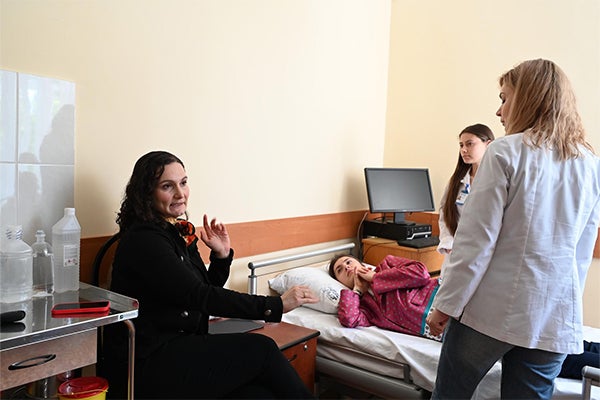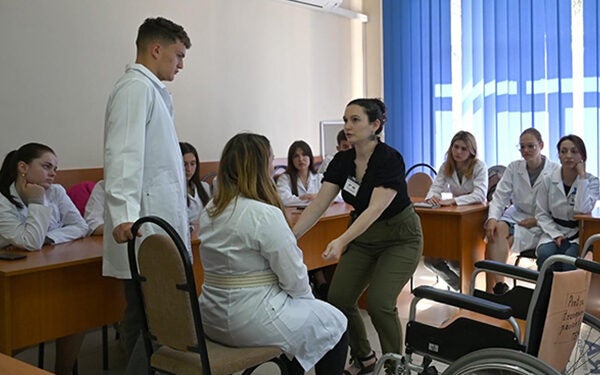Pirate nurse alumna leads health care change in Moldova
Alumna Hilary Mendel had a plan to change the world when she arrived at East Carolina University in 2006. The Pirate nurse has seen that vision through, using her nursing education to make real change in the lives of nurses, and their patients, half a world away.
After graduating from ECU in 2010, Mendel worked as a nurse in Rocky Mount before moving to Ohio, where she earned her master’s degree and began teaching nursing students.
In 2021, she started a nurse education doctoral program at UNC Greensboro, where a professor introduced her to the North Carolina-Moldova Partnership for Peace program.
Mendel was invited to join the North Carolina Nursing Moldova Collaborative, and in February was invited to be the first American nurse to lecture in Moldovan nursing schools on health prevention and health promotion, unique because most Moldovan nursing teachers have historically been medical doctors.
“They don’t have a nursing practice act, so what a nurse is, is very loose in their country. They sometimes have as many as 30 patients in the hospital,” Mendel said. “They leave, a lot of times very rapidly, to go to other countries that pay more.”

Pirate nurse Hilary Mendel discusses patient care techniques with Moldovan nursing students. (Contributed photo)
Mendel was impressed by the Moldovan nursing student’s eagerness to learn and put that learning into practice. The concept of a master’s prepared nurse is still evolving in Moldovan culture, but Mendel said her peers want masters prepared nurses to train future generations of nurses, as happens in the U.S. and other developed nations.
“They are so passionate about anything that we give them. It was such an inspirational experience. Our students are not nearly as passionate about learning because it’s something we take for granted in the U.S., to have the opportunity to learn and grow,” Mendel said. “Their students understand it is very much an honor.”
Mendel said it was a revelation to the Moldovan students that a nurse could collect data and influence change like she did with her doctoral research. She graduated this summer and will defend her dissertation in October.

Hilary Mendel demonstrates safer patient handling procedures to Moldovan nursing students. (Contributed photo)
“I wanted to deepen my knowledge of nursing, grow professionally, and after becoming a nurse educator I wanted to take the next step and become a nurse scientist and contribute to nursing research and knowledge development,” Mendel said.
Partnership for Peace
The North Carolina-Moldova Partnership for Peace developed shortly after the fall of the Soviet Union in the early 1990s. Mendel said the U.S. State Department partnered U.S. states with former Soviet countries that were newly opened to the west, to align American government, education and community organizations with Moldovan partners to serve as training wheels for developing nations.
North Carolina’s National Guard was the core of the partnership, but the state has had one of the most successful mentorships outside of military support with nations formerly in the Soviet sphere.
“A lot of our old textbooks in nursing and health care, and some of the elementary textbooks, get shipped to the Moldovans in cargo ships,” Mendel said. “They struggle with a Soviet Union mindset.”
Mendel said the director of the nursing program at the University of de Stat de Medicină şi Farmacie, Nicolae Testemiţanu, in Chișinău, Moldova, translated the U.S. nursing textbooks they were gifted and designed a curriculum for an undergraduate nursing program. That same educator has now embarked on a master’s level nursing degree program, which will accept its first cohort this fall, with the help of Partnership for Peace assistance.
Mendel said very basic nursing practices, like understanding body mechanics to prevent injuries to nursing moving patients, are revolutionary concepts in Moldova. But lack of resources and theory doesn’t mean the Moldovans don’t want to progress and become part of a modern Europe. During the COVID-19 pandemic, many tech workers moved back to the country and the government provided incentives like a three-year maternity leave to entice young Moldovans to remain in the country.
The efforts of the state’s Moldova nursing collaborative continue. A shipment of four dozen gait belts that help nurses provide safer patient handling for the nurse and patients arrived at the U.S. Embassy to be distributed to nursing students and hospitals. Mendel believes that even meager strips of cloth like a gait belt will help to advance the nursing profession there, a global extension of ECU’s mission of service.
“They don’t have much, but they work so hard to do what they can with what they do have,” Mendel said.
Lifetime of service
Mendel moved to Raleigh when she was in middle school, after living in three other states, but she’s a North Carolinian through and through. She graduated from Millbrook High School and along the way was presented with the school’s service award, a natural result of a dedication to volunteering in her community.
Mendel is the middle of three siblings. She and her sister helped her single mother to care for her brother, who was in and out of hospitals dealing with chronic health conditions.
“I always say I was scared of blood until I had to help with my brother,” Mendel said. “I decided I wanted to be a nurse in middle school and then was able to get a prestigious internship at Duke Hospital.”
As a high school student she was hired as an assistant for an oncology research project at Duke. She was the only one of her peers who was interested in the grief counseling offered to the cancer patients she worked with. Some of the patients she helped were her age, 16 or 17, which was tough.
In 2006, she started school at ECU as a pre-nursing major. Her friends and family all recommended that she pick an easier track, because of learning differences she experienced, but easy isn’t in Mendel’s nature.
“I’m not someone that takes no for an answer,” Mendel said. “That just meant I had to work harder.”
During the summer between her junior and senior year, Mendel got a competitive externship opportunity at what was then Pitt County Memorial Hospital, now ECU Health Medical Center, working with respiratory failure patients. Her senior-year clinical rotations took her to Nash General Hospital, where she stayed after graduation.
It didn’t take long before Mendel started a master’s in nursing education degree program at Kent State University in Ohio because she wanted to make a difference in the nursing profession. Nursing education seemed the best way to diffuse her knowledge.
“I found being a bedside nurse I can make a difference one patient at time, but the patients don’t always want to get better. Sometimes they are very stubborn. But I found every time I worked with students, they wanted to learn,” Mendel said. “I was energized by the fact that students were engaged in learning, and I could work with them and see outcomes. That was exciting.”
During her time as a student in Ohio, Mendel taught students in a licensed practical nurse program. Those students had limited access to obstetric training because of a lack of clinical sites where they could train.
That same lack of obstetric clinical experience showed Mendel how communities who lack access to quality medical care deal with the challenge, and how they work with the resources at hand to arrive at the best possible outcomes for the sick amongst them.
The area of Ohio where Mendel lived and studied is home to thriving Amish communities, which lack modern health care, both by choice and circumstance, which Mendel experienced firsthand during a shadowing experience at an Old Order Amish birthing center.
“Through that relationship I was able to develop a clinical observation for LPN students, to come from inner-city Cleveland, 45 minutes across the county to get some cultural immersion and experience,” Mendel said.
The men in Amish communities would traditionally deliver babies, Mendel said, which wasn’t the cause of the high mortality among Amish mothers. It was the post-delivery care, or lack thereof, that was the most lethal.
“The postpartum period is when you have a lot of blood loss, when it’s very complicated for the mother. The average farm-working father would not necessarily know what to look for,” Mendel said.
Helping to revamp the center’s medical and nursing policies was a way that Mendel knew she could make a lasting difference. Some of the men in the patriarchal society, who didn’t know how to use a coffee maker and drove a horse-drawn buggy to the center, simply didn’t understand how to connect traditional care practices with modern medical advances.
“Nurses and medical doctors would get called to come to deliveries, but it was asking and respecting their culture and their wishes, mixed with using modern technology to keep them safe,” Mendel said. “We did not do continuous fetal monitoring because they would want to walk around, and we wouldn’t put them in hospital robes. We wouldn’t even put an IV in a woman.”
Mendel also has deep experience with disaster health care, having volunteered with the Red Cross as a nursing student in 2009 to certify nurses to run post-disaster shelters, and through her dissertation research to get older adults access to lights they can keep by their beds to help prevent falls, at night and particularly in the event of power outages.
“I worked in orthopedics and so many older adults would fall during the night. I’ve now got funding for neck lamps that I gave my research participants this spring because we know they’re falling and don’t have resources,” Mendel said.